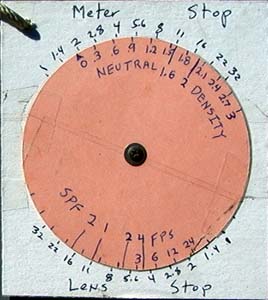Slow Speed Exposure Calculator

Dealing with ND filters at slow shutter speeds can be a problem. Trusting a
computerized light meter can be risky if you are make one wrong entry. Making
a simple calculator is a good exercise to instill a solid understanding of the
problem and can be used to calculate exposure in the field.
Get a 4" diameter circular protractor. Draw a circle centered on a stiff piece
of card. With "0" at the top of the card, mark every 10 degrees starting at
310 past 0 to 50 degrees. Mark 310 as f 1.0, 320 as 1.4, 330 as 2.0 up to f
32 at 50 degrees. Opposite this on the bottom of the dial start f 1.0 at 130
degrees and the same as the top to f 32 at 32 degrees. Mark the upper dial Light
Meter Stop and the bottom dial Camera Lens Stop.
Cut an inner dial out of stiff card that just fits inside the circle of the
outer dial. Mark it at every 10 degrees. At 0 degrees mark 0 ND, .3 ND at 10
degrees, .6 ND at 20 degrees up to 3.0 ND at 100 degrees. Add 1.6 ND at 53 degrees
(1/3 of the way between 1.5 and 1.8) ND. 2.0 ND at 67 degrees ( 2/3 of the way
between 1.8 and 2.1 ND. These last two are the NDs used for no calculation at
1 and 2 seconds exposure with a 1/50 second meter reading.)
On the lower part of the inner dial mark 24 frames at 180 degrees. Mark 12 frames
at 190 degrees, 6 at 200, 3 at 210, 2 fps at 217 degrees 1 fps at 227 degrees
few camera will run continiously at this speed. Label these camera speeds.
Now we are into time lapse motors that expose the whole time the shutter is
open. If the time lapse motor exposure time is set for 1 second, 1 sec on the
dial will be at 235, 2 seconds at 245, 4 sec at 255, 8 at 265 etc.
Now bolt the two dials together at their centers. Notice that with 0 ND and
24 FPS that the light meter stop equals the camera lens stop. If you slow down
the camera, the lens stop increases. You can compensate by adding ND and set
the ND next to the light meter reading. The camera lens stop will be opposite
the camera shooting speed.
Clear packaging tape will protect the dials.
© Copyright 1999-2004 Ron Dexter. All Rights Reserved.

